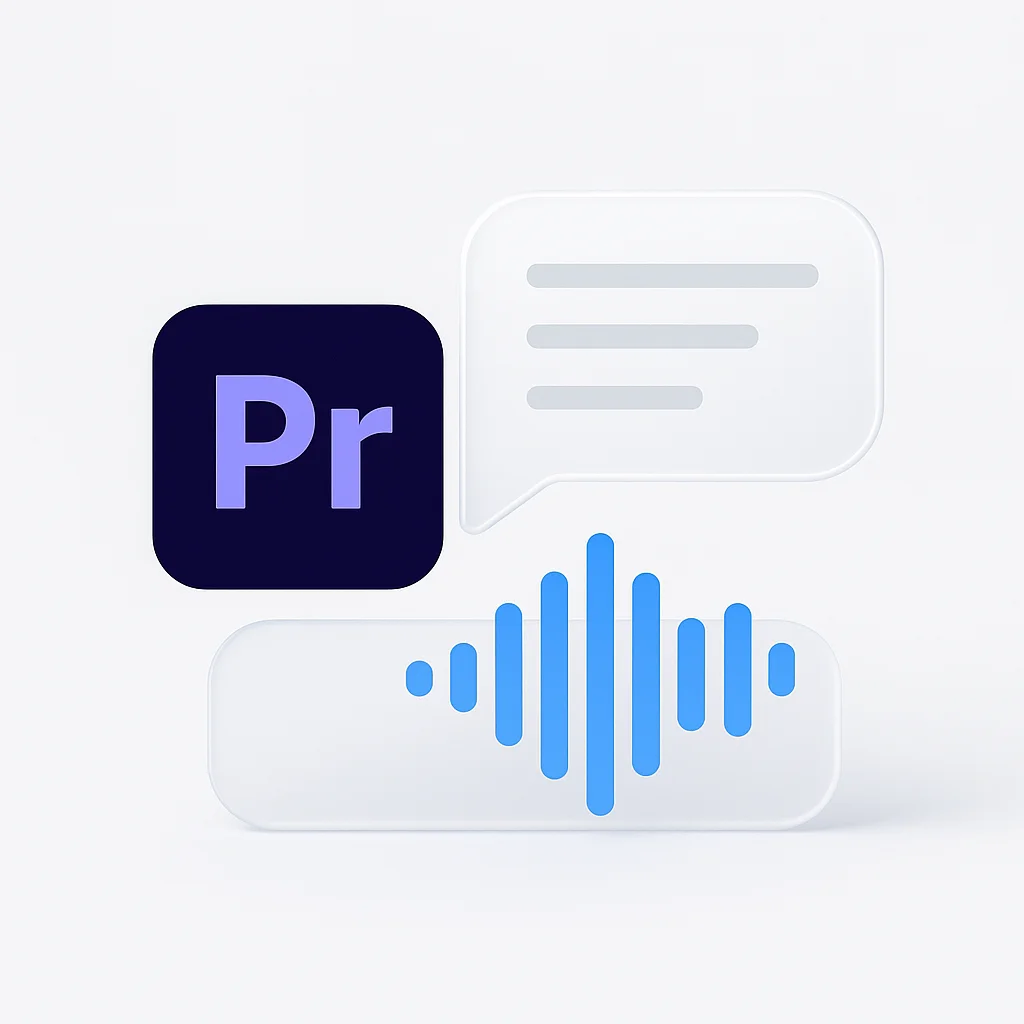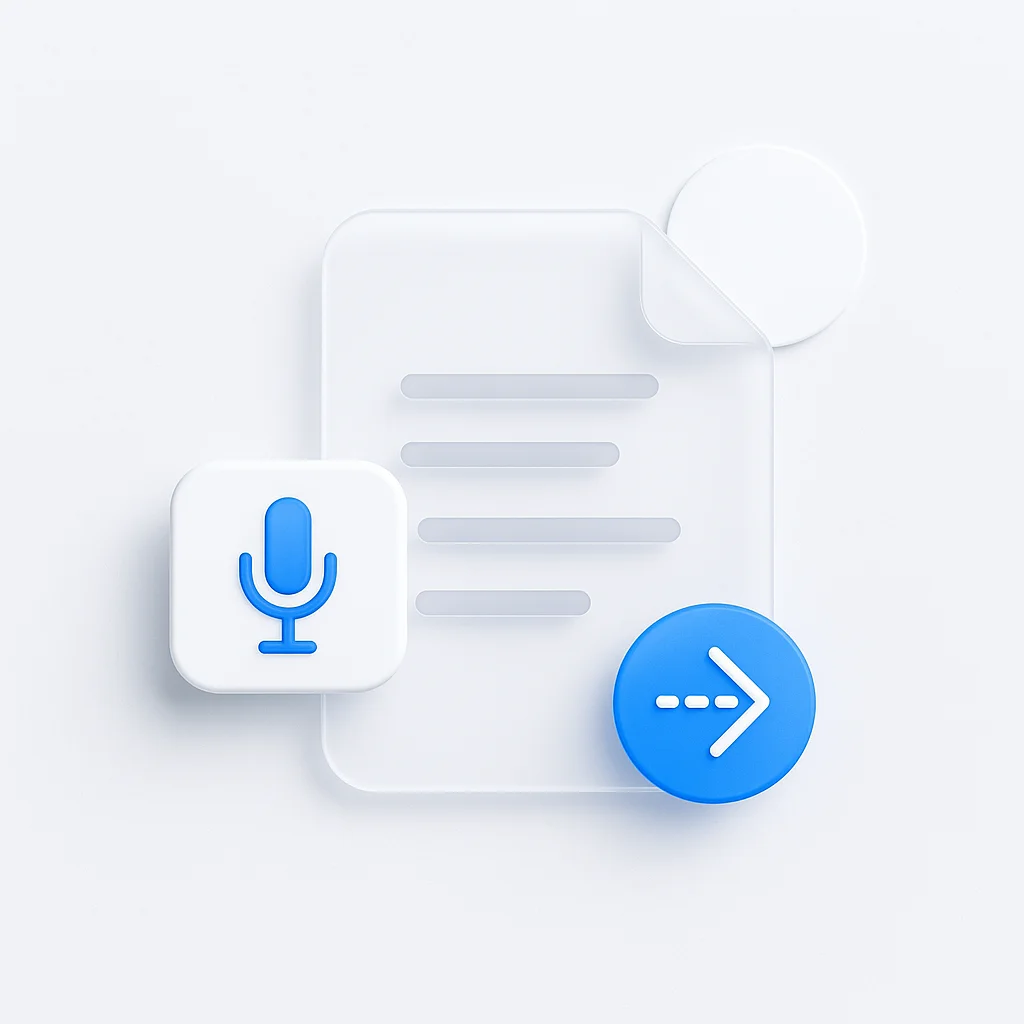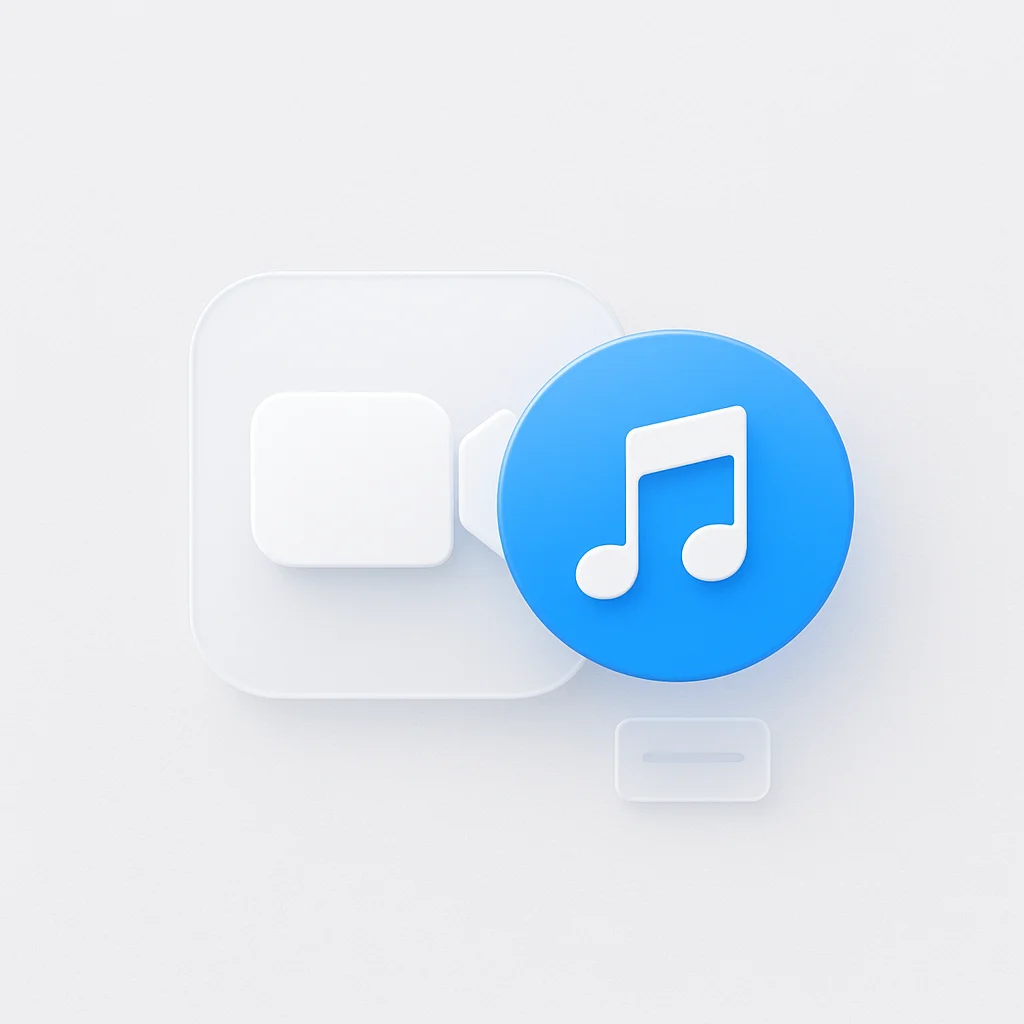Can you record a phone call on an iPhone? The answer is yes and in 2025, you have more options than ever before. But each method comes with its own rules, costs, and limitations.
This is your complete guide to every possible method. We’ll cover the new native iOS 18 call recording feature, the best free apps, how to record a call without an app using Voice Memos, and the crucial legal rules you must follow.
Whether you’re looking for the best way to record a phone call on iPhone for business meetings, interviews, or important conversations, this guide has you covered with step-by-step instructions for all five proven methods.
Before You Record: The Legal Rules You Must Follow
One-Party vs. Two-Party Consent: A Simple Explanation
Before diving into the technical methods, understanding the legal landscape is crucial. In the United States, recording laws vary by state:
- One-party consent states: Only one person (you) needs to know about the recording
- Two-party consent states: All parties must be informed and consent to recording
Two-party consent states include California, Connecticut, Florida, Illinois, Maryland, Massachusetts, Montana, New Hampshire, Pennsylvania, and Washington. International laws vary significantly, so always check your local regulations.
The “Without Notification” Question
Many people search for how to record a phone call on iPhone without notification, but this approach carries serious legal and ethical risks. The safest practice is always to inform all parties before recording. Not only does this protect you legally, but it also maintains trust and transparency in your relationships.
International & Regional Laws
Laws vary globally, and users should check their local regulations. For example, in many European countries under GDPR, explicit consent is required. Some regions have specific business recording requirements, while others may have different rules for personal versus professional use.
Method 1: The New Native iOS 18 Call Recording Feature
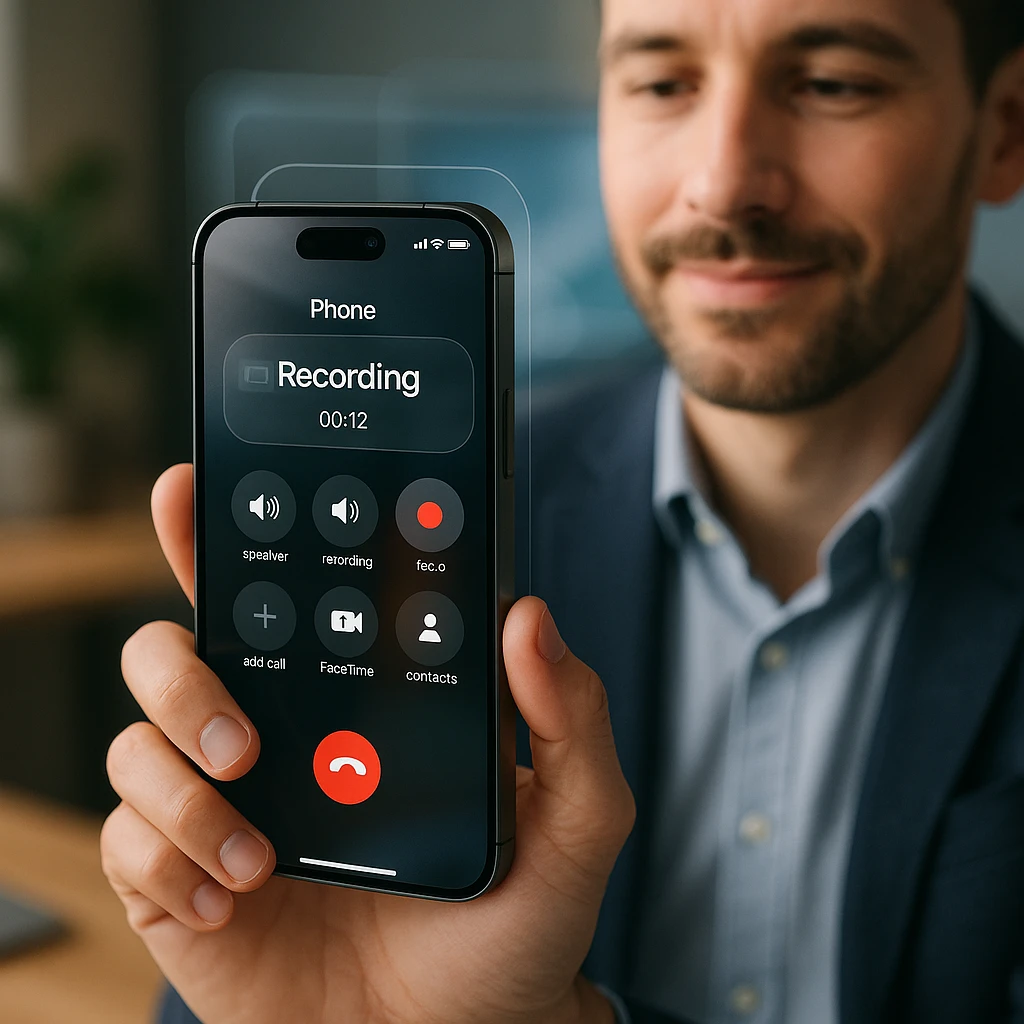
A Deep Dive into Apple’s Built-in Recorder
Apple finally introduced native call recording in iOS 18, making it the most legitimate and user-friendly option available. This feature is integrated directly into the Phone app and automatically notifies all parties when recording begins.
How it Works: The feature uses Apple Intelligence to not only record calls but also provide live transcription and summaries. When you start recording, all participants hear an announcement that the call is being recorded.
Device Compatibility: This feature works on any iPhone running iOS 18, including:
- iPhone 15 Pro and Pro Max
- iPhone 15 and 15 Plus
- iPhone 14 Pro and Pro Max
- iPhone 14 and 14 Plus
- iPhone 13 Pro and Pro Max
- iPhone 13 and 13 Mini
- iPhone 12 Pro and Pro Max
- iPhone 12 and 12 Mini
- iPhone 11
Step-by-Step Guide to iOS 18 Call Recording
- Start or answer a phone call using the Phone app
- Look for the recording button in the call interface (appears as a waveform icon)
- Tap the record button - all participants will hear “This call is being recorded”
- Continue your conversation normally while recording is active
- Tap the record button again to stop recording
- Access your recording in the Notes app where it’s automatically saved with transcription
Where Recordings are Saved: Unlike other methods, iOS 18 saves recordings directly in the Notes app with automatic transcription, making them searchable and easy to organize.
Method 2: The Free & App-less “Voice Memo” Technique
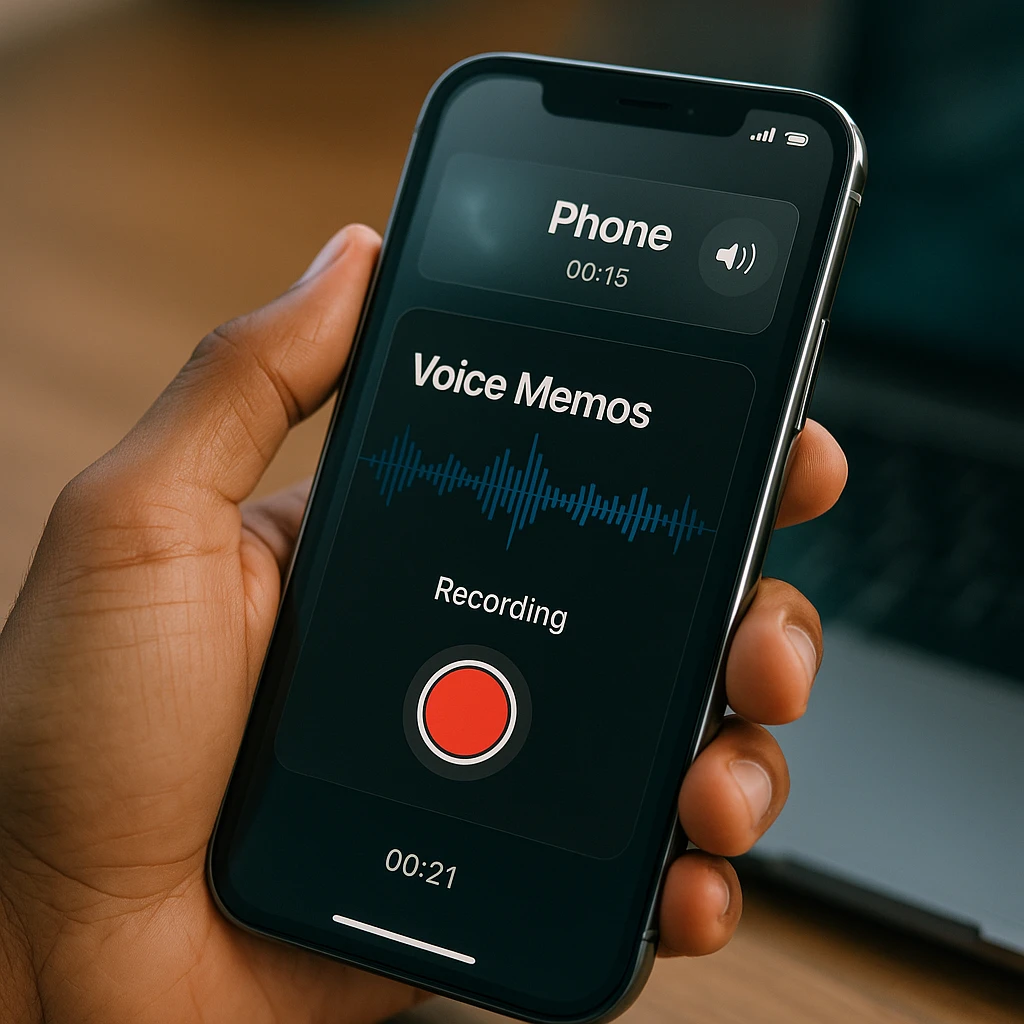
How to Record a Phone Call on iPhone for Free (Without an App)
This method directly targets users looking for a completely free solution without downloading additional apps. Here’s the step-by-step process:
Step-by-Step Guide:
- Start your phone call normally
- Put the call on speakerphone (this is crucial for audio capture)
- Open the Voice Memos app while the call is active
- Tap the red record button in Voice Memos
- Continue your conversation - both sides will be recorded through the speaker
- Stop the Voice Memo recording when the call ends
- Save your recording with a descriptive name
Pros:
- Completely free
- No additional apps required
- Works on any iPhone
- Recordings saved locally on your device
Cons:
- Requires speakerphone (privacy concerns)
- Lower audio quality compared to dedicated apps
- Background noise can interfere
- Not suitable for confidential calls
Pro Tip: For better audio quality, use this method in a quiet room and position your iPhone strategically to capture both voices clearly.
Method 3: The Best Call Recorder Apps for iPhone (2025 Review)
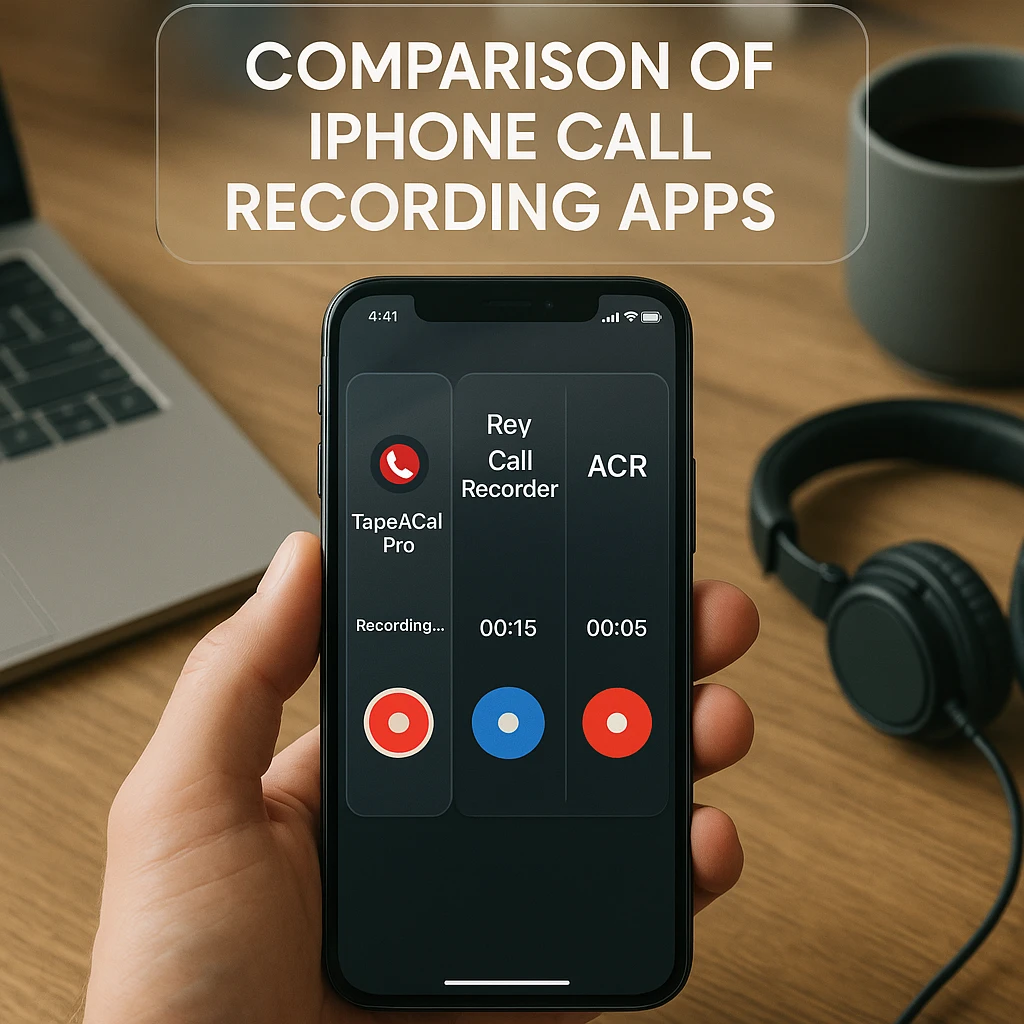
When to Use a Third-Party App
Third-party apps are ideal when:
- The native iOS 18 feature isn’t available in your region
- You need automatic recording capabilities
- You require advanced features like cloud storage or transcription
- You’re using an older iPhone that doesn’t support iOS 18
Top Free & Paid Apps Compared
Here’s a comprehensive comparison of the best call recorder apps for iPhone in 2025:
| App | Best For | Key Feature | Cost | Rating |
|---|---|---|---|---|
| Rev Call Recorder | Free Recording (US only) | High-quality unlimited recording | Free | 4.5/5 |
| TapeACall Pro | Reliability & Features | Transcription, cloud storage | $10.99/month | 4.3/5 |
| ACR Call Recorder | Ease of Use | Simple interface, auto-recording | $9.99/month | 4.1/5 |
| Call Recorder Plus | International Users | Works globally | $7.99/month | 3.9/5 |
| NoNotes | Business Users | CRM integration, team sharing | $19.99/month | 4.2/5 |
Rev Call Recorder stands out as the best free app to record a phone call on iPhone for US users, offering unlimited recording without subscription fees. However, it’s geographically restricted and only works within the United States.
TapeACall Pro is the most reliable paid option, offering features like:
- Automatic transcription
- Cloud storage and backup
- Easy sharing options
- International calling support
- High-quality audio recording
How to Set Up Third-Party Call Recording Apps
- Download your chosen app from the App Store
- Create an account and complete the setup process
- Grant necessary permissions (microphone, phone access)
- Configure recording preferences (automatic vs. manual)
- Test the app with a friend to ensure quality
- Start recording according to the app’s specific instructions
Most apps use a conference call method where the app dials a recording line and merges it with your call, which explains why they work despite iOS restrictions.
Method 4: Using Google Voice (for Incoming Calls Only)
A Niche but Useful Free Option
Google Voice offers a built-in call recording feature, but with significant limitations. It’s perfect for specific use cases but won’t work for everyone.
How to Set Up Google Voice Recording:
- Sign up for Google Voice and get a Google Voice number
- Enable call recording in Google Voice settings
- Give people your Google Voice number for calls you want to record
- Press 4 during incoming calls to start recording
- Press 4 again to stop recording
Crucial Limitations:
- Only works for incoming calls to your Google Voice number
- Automatically announces recording to both parties
- Requires people to call your Google Voice number instead of your regular number
- Not suitable for outgoing calls or emergency use
Best Use Cases:
- Business customer service lines
- Interview recordings from journalists
- Legal consultations where you control the number used
Method 5: External Hardware Recorders
The Professional & Fail-Safe Method
For users who need the highest quality recordings or complete independence from software restrictions, external hardware offers the most reliable solution.
Types of Hardware:
-
Bluetooth Recording Devices:
- RecorderGear PR200 Bluetooth Call Recorder ($199)
- PhotoFast Call Recorder X ($149)
- Compatible with any iPhone via Bluetooth connection
-
Headphone Jack Adapters (for older iPhones):
- Olympus TP-8 Telephone Pick-up Microphone ($25)
- Requires iPhone with headphone jack or Lightning adapter
-
Digital Voice Recorders:
- Zoom H1n Handy Recorder ($99)
- Sony ICD-UX570 Digital Voice Recorder ($89)
- Place near phone on speakerphone for recording
Professional Use Cases:
- Legal depositions and court proceedings
- Journalism and investigative reporting
- Medical consultations (with proper consent)
- Business negotiations requiring backup recordings
Advanced Recording Techniques
Recording FaceTime Audio Calls
Can you record FaceTime audio calls? Yes, but the methods vary:
- iOS 18 Native Feature: Works with FaceTime audio calls
- Screen Recording: Use iPhone’s built-in screen recording for FaceTime video calls
- Third-party Apps: Most call recording apps also support FaceTime calls
- Mac Recording: Use QuickTime Player on Mac to record FaceTime calls
Using ScreenApp for Call Documentation
While ScreenApp specializes in screen recording and video recording, it’s an excellent tool for documenting call-related activities:
- Record your screen while taking notes during calls
- Capture important information displayed during video calls
- Create tutorials showing how to use call recording apps
- Document call setup processes for team training
For comprehensive video recording needs beyond phone calls, ScreenApp offers professional recording solutions that integrate seamlessly with your workflow.
Troubleshooting Common Issues
”Why can’t I record a call on my iPhone?”
Problem: The native recording button is missing Solution:
- Ensure you have iOS 18 or later installed
- Check if call recording is available in your region
- Restart your iPhone and try again
- Contact Apple Support if the feature should be available
Problem: Third-party apps aren’t working Solution:
- Check app permissions in Settings > Privacy
- Ensure you have a stable internet connection
- Try reinstalling the app
- Verify the app works in your country/region
Audio Quality Issues
Problem: Poor audio quality in recordings Solution:
- For Voice Memo method: Move to a quieter room
- Use headphones during calls for better audio separation
- Ensure strong cellular or Wi-Fi signal
- Clean your iPhone’s microphone and speaker
”Can you screen record a phone call on iPhone?”
This is a common question with a specific answer: No, iOS prevents screen recording from capturing audio during phone calls for privacy reasons. When you start a phone call, screen recording automatically stops capturing microphone audio, even if the recording continues visually.
Alternative Solutions:
- Use the methods outlined in this guide instead of screen recording
- For video calls, use dedicated video call recording features
- Consider external hardware recording for complete capture
App-Specific Troubleshooting
TapeACall Pro Issues:
- Ensure three-way calling is enabled with your carrier
- Check that you’re dialing the correct access number
- Verify your subscription is active
Rev Call Recorder Problems:
- Confirm you’re in a supported location (US only)
- Check microphone permissions
- Try recording a test call first
Legal and Ethical Best Practices
Professional Recording Guidelines
When recording calls for business purposes:
- Always announce recording at the beginning of calls
- Get explicit verbal consent from all participants
- Document consent in meeting notes or recordings
- Store recordings securely with proper access controls
- Set retention policies for how long recordings are kept
- Train staff on proper recording procedures
Personal Recording Etiquette
For personal calls:
- Ask permission before recording family or friends
- Explain why you want to record the conversation
- Respect others’ wishes if they decline
- Be transparent about how recordings will be used
- Delete recordings when they’re no longer needed
Frequently Asked Questions (FAQ)
What is the best way to record a phone call on iPhone?
For most users in 2025, the iOS 18 native call recording feature is the best option because it’s free, built-in, legally compliant (announces recording), and provides automatic transcription. For users without iOS 18, TapeACall Pro offers the most reliable third-party solution.
Is there a way to record iPhone calls automatically?
Yes, several methods support automatic recording:
- TapeACall Pro: Offers automatic recording for all calls
- ACR Call Recorder: Can be configured for auto-recording
- NoNotes: Provides automatic recording with business features
- iOS 18: Manual activation required but saves automatically
How do I record a FaceTime audio call?
FaceTime audio calls can be recorded using:
- iOS 18 native feature (if available)
- Third-party apps like TapeACall Pro
- Voice Memo method on speakerphone
- Mac QuickTime if using FaceTime on Mac
Where can I find my saved call recordings?
Recording locations vary by method:
- iOS 18: Automatically saved in Notes app with transcription
- Voice Memos: Saved in Voice Memos app
- TapeACall Pro: Available in-app and cloud storage
- Rev Call Recorder: Saved locally and optionally in cloud
- Google Voice: Accessible through Google Voice web interface
What is the best call recording app for international use?
For users outside the US, TapeACall Pro is the most reliable option as it works internationally and offers features like:
- Global calling support
- Multiple language transcription
- Cloud storage and sync
- Professional-grade audio quality
Call Recorder Plus is another good international option with broader geographic support and competitive pricing.
Can I use recorded phone calls as legal evidence?
The admissibility of recorded calls as legal evidence depends on:
- Local recording laws (one-party vs. two-party consent)
- How the recording was obtained (legally vs. illegally)
- Court jurisdiction and specific case circumstances
- Proper authentication of the recording
Always consult with a legal professional before relying on recordings for legal purposes.
How do I improve call recording quality?
To enhance recording quality:
- Use a strong signal: Ensure good cellular or Wi-Fi connection
- Choose quiet environments: Minimize background noise
- Use headphones: Better audio separation and clarity
- Position properly: Keep iPhone close during speakerphone recording
- Test beforehand: Always test your chosen method first
- Use professional apps: Paid apps often offer better audio processing
Conclusion: Choosing the Right Recording Method for You
The landscape of iPhone call recording has dramatically improved in 2025, with Apple’s introduction of native recording in iOS 18 leading the way. Here’s how to choose the best method for your specific needs:
For everyday use and legal compliance: The iOS 18 native feature is the clear winner. It’s free, announces recording automatically, includes transcription, and integrates seamlessly with your iPhone.
For professional flexibility: TapeACall Pro offers the most comprehensive feature set with automatic recording, cloud storage, transcription, and international support.
For occasional free recording: The Voice Memo method provides a no-cost solution, though with quality limitations that make it suitable only for non-critical recordings.
For specific incoming call needs: Google Voice fills a niche role for users who can control which number people call.
For professional-grade quality: External hardware recorders provide the highest quality and most reliable option for critical recordings.
Remember the golden rule: Always prioritize consent and check your local laws before recording. When in doubt, ask for permission and be transparent about your recording intentions. This approach not only keeps you legally safe but also maintains trust and professionalism in your relationships.
Whether you’re recording business meetings, conducting interviews, or preserving important conversations with family, the right tool combined with proper etiquette will serve you well. Choose the method that best fits your specific needs, budget, and technical requirements.
For users who need comprehensive video recording capabilities beyond phone calls, consider exploring ScreenApp’s professional recording solutions that complement these phone recording methods perfectly.
